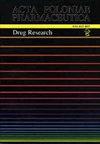健康女性头皮发中铜、锌、碘、硒含量的变化及草药提取物洗发效果的研究
IF 0.4
4区 医学
Q4 PHARMACOLOGY & PHARMACY
引用次数: 0
摘要
我们研究了与洗发水相关的女性头皮头发中某些微量元素水平的变化及其对头皮皮肤特性的影响。60名健康女性分为对照组和实验组,分别使用常规洗发水和大麻酚提取物洗发水。使用电子皮肤分析仪检查头皮皮肤,并使用Folliscope进行毛滴虫分析。使用电感耦合等离子体质谱法(ICP-MS)对收集的头皮毛发样品进行消化和测量。实验组的平均铜(p=0.005)、锌(p=0.0002)和碘(p=0.0004)水平显著增加,而硒含量略有下降(p=0.0337)。我们发现,蒙古族女性头皮头发中的平均碘含量比全球平均水平低三倍。微量元素的平均增加可以被认为是由于在洗发过程中一种元素转移到人体头皮中。这些结果表明,人类头皮头发中的一些微量元素不仅与营养状况和环境因素有关,而且化妆品也会影响微量元素的组成。实验组的毛发生长、直径和密度逐渐增加,并且高于对照组。实验组头皮皮肤水分、皮脂和pH值增加,而对照组没有显著差异。草药提取物可能有助于头皮毛发生长并增加头发密度。这种能力可以通过草药提取物中的微量元素来解释,这些元素可能在诱导头发生长中发挥关键作用。本文章由计算机程序翻译,如有差异,请以英文原文为准。
The change of copper, zinc, iodine, and selenium contents in the scalp hair of healthy females and the efficacy of herbal extract shampoo treatment
We investigated shampoo-related changes in levels of some trace elements in the scalp hair of females and their impact on scalp skin properties. Sixty healthy women divided into control and experimental group who used regular shampoo and Urtica cannabina (U.cannabina) extract shampoo, respectively. Scalp skin was examined using an electronic skin analyzer, and trichometric analysis was performed with a Folliscope. The collected scalp hair samples were digested and measured using inductively coupled plasma-mass spectrometry (ICP-MS). The average copper (p=0.05), zinc (p=0.0002), and iodine (p=0.0004) levels increased notably, whereas the selenium content decreased slightly (p=0.337) in the experimental group. We found that the average iodine content in scalp hair of Mongolian females was three times lower than the global average. The average increase in trace elements may be considered to be due to the transfer of an element into the human scalp during shampooing. These results indicate that some trace elements in human scalp hair are not only associated with nutritional status and environmental factors, but cosmetic products can also affect the trace element composition. The hair growth, diameter, and density gradually increased and were higher in the experimental group than in the control group. Scalp skin moisture, sebum, and pH values increased in the experimental group, whereas the control group showed no notable difference. Herbal extracts may potentially support scalp hair growth and increase the hair density. This ability can be explained by the trace elements in the herbal extract, which may play a key role in inducing hair growth.
求助全文
通过发布文献求助,成功后即可免费获取论文全文。
去求助
来源期刊
CiteScore
0.80
自引率
0.00%
发文量
74
审稿时长
6-12 weeks
期刊介绍:
The international journal of the Polish Pharmaceutical Society is published in 6 issues a year. The journal offers Open Access publication of original research papers, short communications and reviews written in English, in all areas of pharmaceutical sciences. The following areas of pharmaceutical sciences are covered: Analysis, Biopharmacy, Drug Biochemistry, Drug Synthesis, Natural Drugs, Pharmaceutical Technology, Pharmacology and General.
A bimonthly appearing in English since 1994, which continues “Acta Poloniae Pharmaceutica”, whose first issue appeared in December 1937. The war halted the activity of the journal’s creators. Issuance of “Acta Poloniae Pharmaceutica” was resumed in 1947. From 1947 the journal appeared irregularly, initially as a quarterly, then a bimonthly. In the years 1963 – 1973 alongside the Polish version appeared the English edition of the journal. Starting from 1974 only works in English are published in the journal. Since 1995 the journal has been appearing very regularly in two-month intervals (six books a year). The journal publishes original works from all fields of pharmacy, summaries of postdoctoral dissertations and laboratory notes.

 求助内容:
求助内容: 应助结果提醒方式:
应助结果提醒方式:


